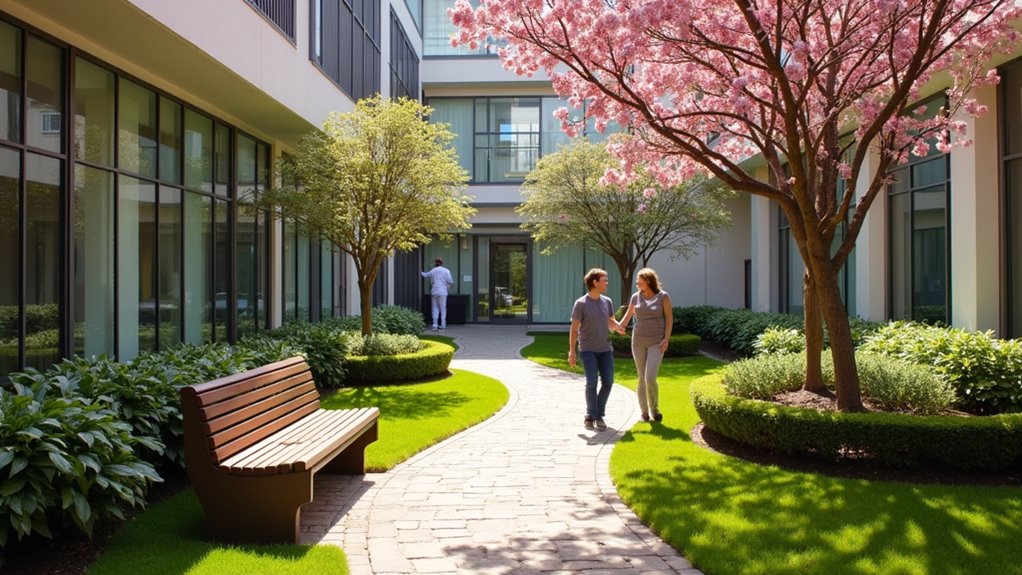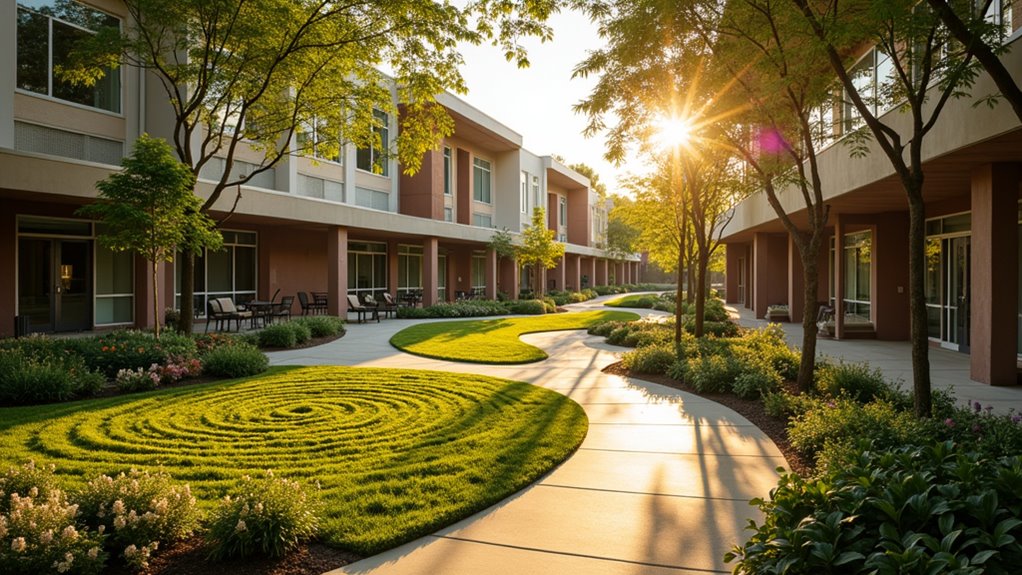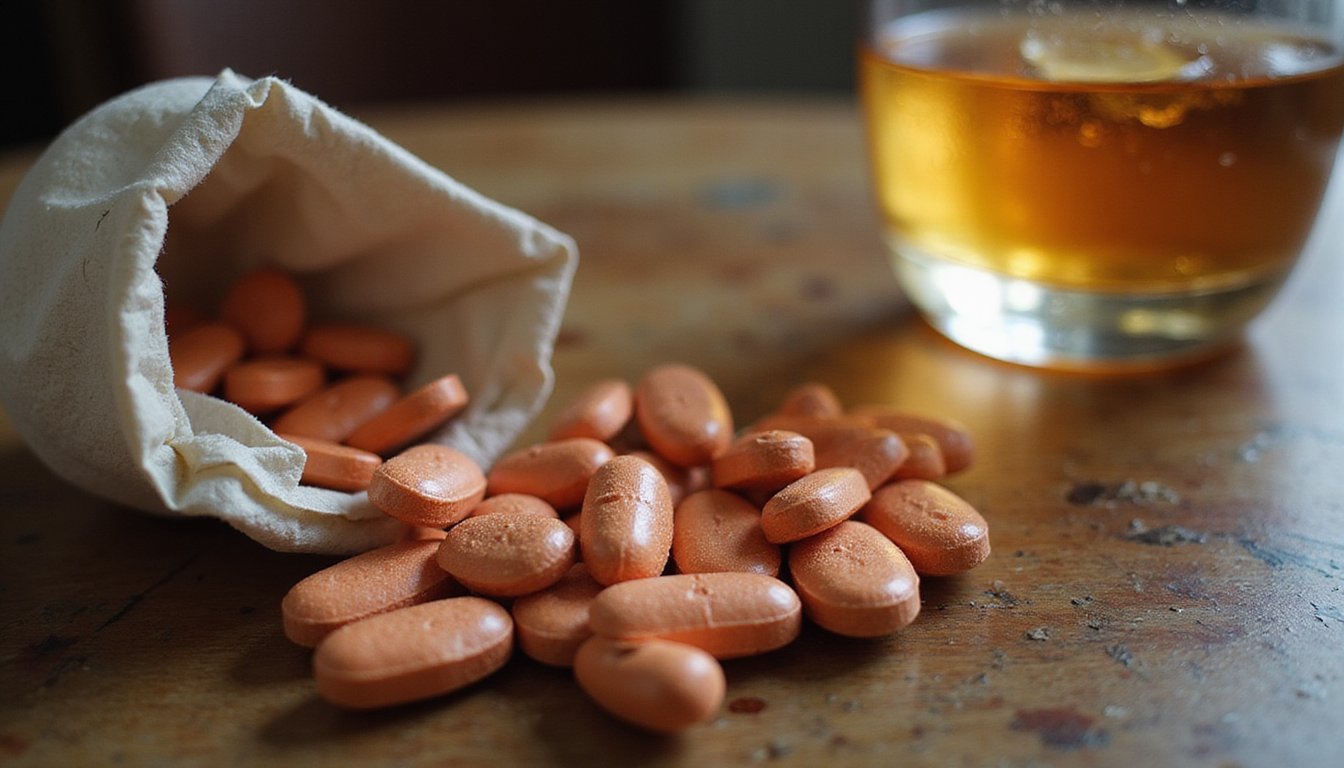Residential addiction treatment offers your best chance at lasting recovery, with success rates up to 71% for longer stays. You’ll benefit from 24/7 professional support, extensive therapy, and a structured environment away from triggers. If you’re struggling with severe addiction, lack a stable home environment, or need intensive supervision, inpatient care provides the immersive healing space you need. Uncover how the length of your stay and program choice can dramatically improve your recovery outcomes.
Understanding the Residential Treatment Advantage

While many treatment options exist for addiction recovery, residential programs consistently demonstrate superior outcomes through their extensive, immersive approach.
You’ll find that the residential benefits extend far beyond basic treatment, with higher completion rates and better long-term success compared to outpatient care. Learning life skills and reintegration is a key focus of the residential treatment process.
The structured environment greatly enhances your treatment engagement by providing 24/7 professional support and removing external distractions. Sadly, more than 95% of those needing drug rehabilitation services never receive the treatment they require.
You’re immersed in a healing space where you can focus entirely on your recovery process.
Research shows that longer stays in residential treatment particularly 90 days or more reduce relapse rates by up to 50% compared to shorter programs.
With constant access to thorough care, including medical supervision, counseling, and peer support, you’ll develop stronger foundations for lasting recovery in a safe, supportive setting.
Key Success Factors in Recovery Programs

Success in residential addiction treatment hinges on several interconnected factors that shape your recovery process. The length of your stay plays an essential role, with programs lasting 6+ months showing considerably higher success rates of 68-71%.
However, you can achieve comparable outcomes in 3-5 months if you maintain strong completion motivation and fully engage in your treatment plan. Treatment data shows that individual therapy sessions, conducted 4-5 times weekly, are a vital component of successful recovery programs.
Your success also depends heavily on personalized interventions that adapt to your specific needs and progress. When you complete your program and participate in structured aftercare support, you’re more likely to maintain long-term sobriety.
Studies show that program completers achieve 43% better outcomes than non-completers. Remember, your recovery path doesn’t end with residential treatment ongoing support and aftercare services will help you bridge the shift to independent living. Finding the right support system is crucial, as support groups can provide essential accountability and connection with others in recovery.
Making an Informed Treatment Choice

When choosing a residential addiction treatment program, you’ll need to carefully evaluate several key factors to find the right fit for your recovery path. Reflect on your personal motivations, treatment goals, and living situation to determine if residential care aligns with your needs. While residential programs can be beneficial, studies show that outpatient treatment approaches can produce similar outcomes.
| Factor to Reflect On | Key Questions |
|---|---|
| Addiction Severity | Are you experiencing severe symptoms requiring 24/7 supervision? |
| Support System | Do you have a stable, supportive home environment? |
| Time Commitment | Can you dedicate 6+ months to residential treatment? |
| Financial Resources | What insurance coverage or payment options are available? |
| Treatment Style | Do you prefer group or individual therapy approaches? |
Your success in recovery often depends on matching the treatment intensity to your specific circumstances. Research shows that residential programs achieve higher abstinence rates (68-71%) for those who complete six months or more, particularly if you’re dealing with an unstable living environment or high relapse risk. Comprehensive treatment programs that combine medication and counselling have shown remarkable effectiveness, reducing drug use by up to 90% after two years of treatment.
The Role of Length and Program Commitment
The length of time you spend in residential addiction treatment plays an essential role in your recovery success. Research shows that longer treatment duration, particularly 90 days or more, greatly improves your chances of maintaining sobriety. Studies have consistently demonstrated that total abstinence rates increase significantly with extended treatment programs.
Program structure and counseling intensity increase in effectiveness when you commit to extended care, allowing for thorough skill development and relapse prevention strategies.
Key benefits of longer-term residential treatment include:
- Personalized plans that adapt to your progress and changing needs
- Stronger support systems through sustained peer and professional relationships
- Improved skill development in stress management, life skills, and coping mechanisms
Your recovery outcomes improve considerably when you invest in programs lasting three months or longer, as they provide the time needed to address underlying issues and establish lasting behavioral changes through intensive counseling and structured support.
Navigating Treatment Options and Support Systems
Making informed decisions about addiction treatment starts with understanding your available options and support systems. While community-based programs offer flexibility, residential treatment provides extensive care with built-in peer support and professional guidance integrated into your daily routine.
You’ll find that residential programs offer distinct advantages: 24/7 supervision, removal from triggers, and structured environments that foster accountability.
These settings also provide access to specialized therapies and mental health services that might be limited in outpatient care. If you’re struggling with an unsupportive home environment or need intensive support, residential treatment’s success rates are compelling – especially in areas like employment outcomes and sustained abstinence.
Residential treatment programs excel at delivering comprehensive mental health support and therapy options while removing patients from challenging home environments.
Consider how each option aligns with your needs for community involvement, professional support, and the level of structure required for your recovery pathway.
Frequently Asked Questions
Can I Bring My Personal Electronic Devices to Residential Treatment?
Device policies vary among residential treatment facilities, but you’ll typically face some restrictions on personal electronics.
Many centers allow phones after an initial hold period, while others maintain stricter communication guidelines. You’ll want to check specific policies during admission, as rules can range from complete prohibition to supervised access.
Some facilities offer exceptions for work-related needs or provide alternative ways to stay connected with loved ones.
What Happens if I Need to Leave Treatment Early for an Emergency?
If you need to leave for an emergency, inform your treatment team immediately.
They’ll help coordinate emergency procedures and work to maintain your treatment continuity.
Medical emergencies typically result in transfers to appropriate facilities where you can continue receiving care.
For non-medical emergencies, your team will help develop a plan that addresses your situation while protecting your recovery progress.
Are Private Rooms Available, or Will I Share With Other Residents?
While most rehab facilities offer shared accommodations, private rooms are available at select locations, particularly in upscale programs.
You’ll typically share living spaces with other residents as part of the therapeutic community approach.
If room privacy is essential to you, you can specifically request facilities with private rooms and bathrooms during your search.
Keep in mind that private rooms often come with higher costs and may not be covered by standard insurance plans.
Can Family Members Visit During Residential Treatment, and How Often?
Yes, family involvement is typically encouraged during residential treatment, but visitation policies vary by facility.
You’ll find that most centers allow immediate family members to visit after an initial adjustment period. Visits may occur weekly, biweekly, or monthly, depending on your program’s structure.
Your treatment team will need to approve visitors, and they’ll help coordinate appropriate visiting times that don’t interfere with your therapy schedule.
Will My Health Insurance Cover the Full Duration of Residential Treatment?
Your health insurance coverage for residential treatment will vary based on your specific policy.
While most insurance policies cover substance abuse treatment under the Affordable Care Act, they often have coverage limits on duration and services.
You’ll need to verify your plan’s specifics, including in-network providers and prior authorization requirements.
Consider contacting your insurance provider directly to understand your benefits and potential out-of-pocket costs before starting treatment.






